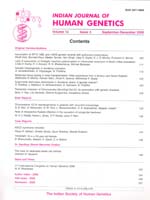
|
Indian Journal of Human Genetics
Medknow Publications on behalf of Indian Society of Human Genetics
ISSN: 0971-6866 EISSN: 1998-362x
Vol. 8, Num. 2, 2002, pp. 43-44
|
Indian Journal of Human Genetics, Vol. 8, No. 2, Jul-Dec, 2002 pp. 43-44
Editorial
Teaching of Medical Genetics in the Medical Colleges of India - Way ahead
K. Ghosh, D. Mohanty
Institute of Immunohaematology, Mumbai
Code Number: hg02009
Traditionally principles of Medical Genetics were taught as a few lecture
series in the anatomy departments for undergraduate MBBS course. Subsequently
some elements of medical genetics
and molecular biology is continued to be taught in Biochemistry, Pharmacology,
Microbiology and in Pediatrics specialities. However this teaching is
largely unstructured and most often rudimentary.
Absence of genetics services e.g. Cytogenetics, Genetic clinics and Genetic counseling units in >90%
of the medical colleges in India hardly encourage
the aspiring medical students to take up any branch
of genetics as a career goal.
Neglecting training in genetics and its current
avtar i.e. molecular biology in medical colleges may have
far reaching consequences for our medical service in
future. Often the managers and politicians holding the
powers to implement various policies shirk their
responsibility by pointing out the absence of finance to
support additional burden of genetic services in various
medical colleges in our country.
So what should we do? The training in genetics
and molecular biology can no longer wait. We are
already late. Future medicine and medical decision making
is going to be heavily dependent on clear
understanding of (i) Genetic risks (ii) Genetic variation in drug
handling (ii) targeting prophylaxis against certain malignant
and degenerative disorders on the basis of genetic
risk evaluation (iv) Transplantation immunology (v)
prenatal diagnosis technology (vi) molecular diagnostics as
used for bacterial & viral diagnosis like estimation of viral
load in HIV infection with its pitfalls and fallacies (vii)
principles of gene therapy and complications which may
potentially arise from such therapy (viii) National programmes
to control heritable disorders like thalassaemias etc.
We feel that it is possible to make a beginning.
For quite some time one or two institutions in our
country had shown how this could be possible.
The Government and its planning wing must
develop a long term goal to develop departments of clinical
& laboratory genetic services all over the country
and because genetic diagnosis if incorrect can
cause immense damage to the user of this service. This
service however, should also come with strict quality control.
Till we have developed that kind of set up let us
see how can we develop a functioning Genetic Service
in the medical colleges immediately. In every
medical college faculty members in the departments of
Anatomy, Physiology, Pharmacology and in addition in
some colleges faculty members of Pathology and
Microbiology often have substantial spare time. Hence man
power from these departments may be given additional
training in centres of excellence like AIIMS, CMC
Vellore, SGPGI, ACTREC, etc (Formerly Cancer
Research Institute Mumbai) and in various excellent
genetics departments of various universities. After a short
training subsequently they can slowly develop their skills
either as clinical geneticists or laboratory geneticists
or molecular biologists. For a modest unit in a
medical college two clinical geneticists, two laboratory
geneticists and one molecular biologist may be required in the
least. These faculty members can initially start
genetic consultancy services in the hospital and
subsequently start the clinics. Repeated short term training in
various aspects of genetics may be needed to improve
their performance.
To get proper funds to set up laboratories for
genetic studies these faculty members in consultation with
their colleagues or other experts may develop one or
two relevant research projects and submit it to the
funding
authorities. To prevent duplication of the services if
there are many medical colleges in the city the services
can be designed in such a way that optimum utilization
of man power and laboratory resources are available.
A proper curriculum in medical genetics and
molecular biology should be developed for undergraduate
student curriculum. They should be integrated in such a way
that the student understands the relevance of these
studies in day to day patient care. Indian Society of
Human Genetics have many learned member in the field
of medical genetics and we are sure that if their
assistance is needed they will be only too happy to help.
In our country nothing seems to progress
without
legislation or establishment of rules. Medical Council
of India (MCI) has an important role to play in this regard.
As education is a state subject, state
governments will do well to review their resources in imparting
training in medical genetics for their faculty in different
medical colleges.It will be a very good idea if various
departments of genetics in the universities or in
autonomous institutions work in unison with the medical
colleges assuring bilateral exchange of expertise,
ultimately promoting the medical genetics in the country. In
this connection we would like to point out that the
genetic counselling units which has cropped in various
places out side medical institutions shuld incorporate a
medical specialist in their team to make it more meaningful
and effective.
Copyright 2002 - the Indian Society of Human Genetics
| 